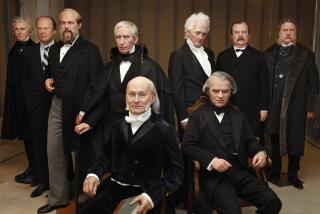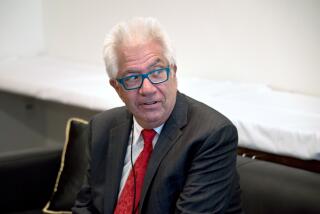List of ‘Top 100’ Should <ka-20>Include Many More Asians </ka-20>
- Share via
Most media lists--Top 10 Pizza Joints or Best Hair Salons--can be taken with a grain of popcorn. How can they be serious? But when a heavily promoted book comes along, proposing to select the most important world players over the past century, it’s asking to be taken seriously. But is it a serious list?
For starters, let’s agree that anyone publishing a book titled “People of the Century” deserves credit for trying. It’s not easy to get us Americans interested in figures other than our fellow Americans. Yet there’s a problem with it that makes you wonder whether in the final analysis it is any more thought-out than the average magazine pizza list. The edition, published in October but promoted through the New Year with millennial hype, was the work of Time magazine and CBS News, once our most prestigious network news outfit, yet the list of 100 world figures contains mainly Americans. This means the list is begging to be looked at a little more carefully, especially for what it may reveal about the mentality of the selectors, if not about the realities of world history.
No quarrel with Einstein, Hitler and Rosa Parks--historic icons who easily make the top-100 grade. From the other half of the world, Asia, only six figures make the list. There’s Mohandas Gandhi, Mao Tse-tung, Ho Chi Minh, Sony Corp. co-founder Akio Morita and the unknown Chinese civilian who, memorably, blocked the Tiananmen Square tanks.
Then editors throw in, perhaps to demonstrate they’re neither stuffed shirts nor ethnocentric stiffs, matinee idol Bruce Lee. Were he alive and kicking today, Lee might wonder about being one of the century’s most important figures, but he’d undoubtedly welcome the company of Lucille Ball and Bart Simpson, who also make the top 100, as do Coco Chanel and Estee Lauder. Yet there were some Asians who did not make the cut that Chanel and Ball might have wanted to make room for.
For example, there’s Akira Kurosawa, the legendary filmmaker. “People of the Century” ignores him to pay homage to the likes of sleazy Louis B. Mayer. Maybe it’s a matter of taste, but when the book elevates to immortality Richard Rodgers, whom the book terms “the 20th century’s greatest tune writer” (Irving Berlin’s fans might not agree), you wish there’d been a place for the Indian poet, novelist and songwriter Rabindranath Tagore. He wrote more songs that are still sung today than probably anyone in the world. India and Bangladesh honor him daily with the national anthems he composed. He was Asia’s first Nobel Prize winner in 1913.
If Nobel Prizes don’t cut it, then how about being a founding father like Emilio Aguinaldo, patriarch of Philippine democracy, or Pridi Phanomyong, ditto for Thai democracy, or even Taiwan’s president, Lee Teng-hui? After all, he was the first popularly elected leader of a Chinese land not just in the last century, but ever. Not on the list.
And if these guys don’t cut it, how about major-league baddies like Pol Pot, the Khmer Rouge mass slayer, or Hideki Tojo, who launched the Pearl Harbor surprise attack? And while New York mafia leader Lucky Luciano is on the list, Southeast Asia’s legendary triad gangs, whose heroin gangsterism ruined many lives right here in the West, are not. Get the picture?
Clearly, what we have here is not just good old American navel-gazing and cultural ethnocentrism, but something more serious. It’s ignorance about the other half of the world. This comes across powerfully with the predictable championing of Mao and the failure to recognize the superiority of his successor, Deng Xiaoping, about whom the more said the better. The former, for all his magnetism, almost ground China to a pulp, whereas his successor resurrected it with long-needed injections of common sense.
What went wrong with the top 100 of Time-CBS, this unintendedly disturbing millennial masterpiece of ethnocentricity? Like the Clinton White House that over two terms could not find one Asian to put in the Cabinet, or like the congressional Cox committee that sometimes seems to view the political sympathies of all Chinese as suspect, we don’t seem to know much about Asia or the people who now or once lived there. One starts out reading “People of the Century” as a kind of fun trip but, in the end, realizes that behind it lies a great cultural tragedy.


